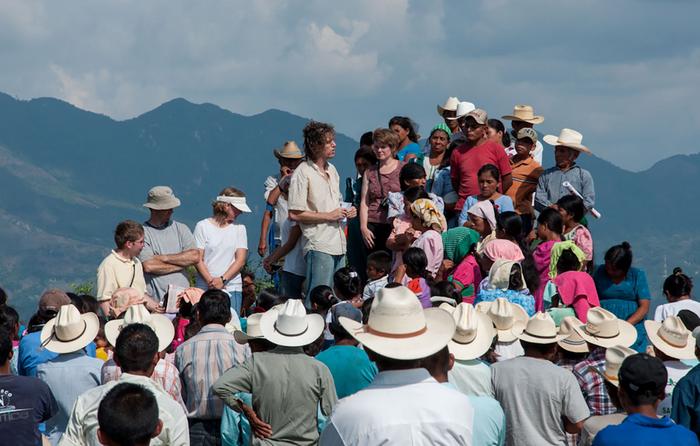In the realm of international development, the translation of good intentions into tangible outcomes often requires more than just altruism; it necessitates effective facilitation and a deep understanding of local contexts. This complexity is laid bare in a revealing new chapter penned by Brent Metz, an esteemed professor of anthropology and the director of the Center for Latin American & Caribbean Studies at the University of Kansas. Amidst the challenges of community-led initiatives, Metz brings forward a critical analysis of a water project in Matazano, Guatemala.
The book, titled "Community-Led Development in Practice: We Power Our Own Change," slated for release by Routledge in 2025, sheds light on the intricate dynamics involved when external entities attempt to assist Indigenous communities. Metz’s contribution is an insightful exploration based on his long-term engagement with the Ch’orti’ Maya people, a relationship that has blossomed since 1991. His firsthand experiences highlight the manifold challenges faced by a Kansas-based Engineers Without Borders group striving to implement a clean water initiative in Matazano, set against a backdrop of historical distrust and a rapidly evolving social fabric.
Central to Metz’s argument is the assertion that merely providing resources or technological solutions is insufficient to inspire genuine change. He emphasizes the urgent need for skilled facilitators who can bridge the cultural and power divides that often complicate such endeavors. He likens this need to a translation, not only of language but of social principles and communal aspirations. For full success, the interaction between the Engineers Without Borders team and local partners must be navigated through sensitive and informed dialogues, which Metz suggests often lack in traditional development approaches.
In his chapter, Metz elaborates on the prevalent socio-political tensions within the Ch’orti’ communities, where legacies of colonialism have bred distrust towards external agents and even amongst local actors. The dynamics of gossip, jealousy, and population growth serve as further hurdles to effective collaboration. Consensus-building, highly valued in Ch’orti’ culture, becomes increasingly difficult as communities expand from hundreds to thousands of members. Metz poignantly notes that the traditional reliance on collective decision-making can buckle under the strain of population pressures, creating fertile ground for disputes.
The challenges inherent in the water project were not merely bureaucratic; they manifested in severe interpersonal conflicts, including threats of violence. For Metz, this underscores a critical recommendation for future initiatives: fostering a consistent platform for community engagement. The goal is to mitigate misconceptions and encourage transparency, which he identifies as paramount to successful project execution. Regular meetings serve as a venue for open dialogue, allowing community members to voice concerns and collaboratively navigate challenges.
Furthermore, Metz’s exploration reveals that participation, often touted as a development goal, requires meticulous groundwork that goes beyond the rhetoric. He argues that mere terminology does not equate to action; instead, the nuanced understanding of communal practices and concerns must guide the integration of innovative solutions. This underscores the dual learning process required—engineers must familiarize themselves with the Ch’orti’ way of life, while community members need insight into the demands and workings of engineering.
Drawing attention to the struggles of organizing community efforts, Metz points out that while engineers may possess the technical prowess necessary for the project, their success hinges on an understanding of local sociopolitical landscapes. Each community, indigenous or otherwise, carries its unique set of conflicts and alliances. Ignoring these aspects can lead to missed opportunities and ineffective collaboration. Metz insists that the first step in any similar future initiatives should be an assessment of prevailing local conflicts and dynamics.
As warned by Metz, the path to community empowerment is ripe with obstacles, which must be navigated with care and cultural sensitivity. He articulates that organizing community participation is often the most formidable aspect of such projects. For engineers, who are typically trained to execute straightforward solutions, adapting to the layered realities of community life can prove daunting. There is a learning curve on both sides—engineers must adapt to the cultural specifics of the Ch’orti’ and vice versa.
Interestingly, Metz’s analysis does not merely focus on the failures associated with the project; he also highlights the profound potential for learning inherent in these cross-cultural exchanges. Each engagement is rich with lessons that can enhance future endeavors. This dynamic interplay can cultivate a deeper appreciation for Indigenous knowledge systems, which may offer innovative approaches to the challenges faced. The implications of such a mindset reverberate beyond individual projects; they signify a broader shift towards more inclusive and culturally cognizant development practices.
In summary, Metz’s chapter serves not just as a critique of particular projects but as a broader commentary on the principles of international development. His insights beckon stakeholders to reconsider conventional methodologies and embrace a framework that prioritizes authentic engagement with local communities. The journey toward sustainable development is complex, yet through genuine collaboration and a nuanced understanding of social contexts, it holds the promise of transformation.
In conclusion, Metz’s findings illuminate the pressing need for facilitators in developmental contexts who can navigate the intricate web of local dynamics. The call for a deeper, more respectful engagement with communities resonates throughout the chapter and ultimately reflects the hopes for a collaborative future in international development.
Subject of Research: Community Development and Indigenous Engagement
Article Title: Bridging Cultures: The Challenges of Community-Led Development in Guatemala
News Publication Date: October 2023
Web References: University of Kansas
References: Metz B. (2025). Community-Led Development in Practice: We Power Our Own Change, Routledge.
Image Credits: Credit: Ben Rufenacht
Keywords: Community development, Indigenous Peoples, Water projects, Engineers Without Borders, Anthropology, Participation, Consensus building, Cultural sensitivity, Social dynamics, Global development.




